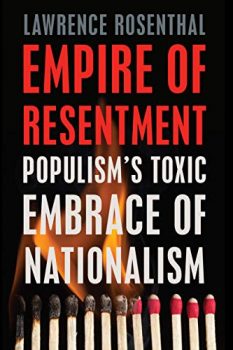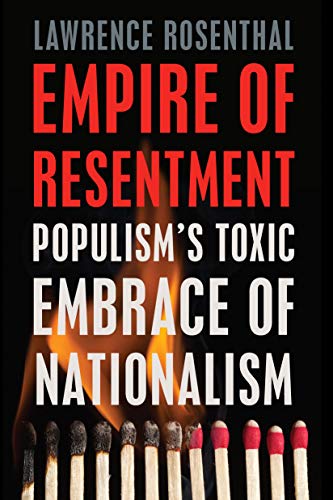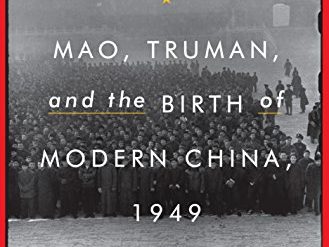
Here’s America’s leading scholar of Right-Wing politics with an up-to-the-minute analysis of the contending forces that have seized hold of the Republican Party.
Because, as UC Berkeley’s Lawrence Rosenthal explains in Empire of Resentment, conservatism comes in many flavors, of which the following are the most prominent:
- Neoliberalism advocates letting free-market capitalism loose on the world with few, if any, restraints.
- Paleoconservatism glories in American nationalism and Christian ethics, pushing for restrictions on immigration and multiculturalism.
- Right-Wing populism (which Rosenthal terms right populism) combines populist rhetoric and anti-elitist sentiments. “Emotion—more than ideology or dogma—is the motor force of populism.”
Empire of Resentment: Populism’s Toxic Embrace of Nationalism by Lawrence Rosenthal (2020) 272 pages @@@@ (4 out of 5)
This leading scholar of Right-Wing politics goes to the heart of the matter
And here’s the gist of Rosenthal’s argument, as laid out on the book’s second page: “Donald Trump won the 2016 election by convincing America’s right-wing populists to migrate ideologically—from the Tea Party’s free-market fundamentalism to Trump’s anti-immigrant, America-First nationalism.” He managed to do so by co-opting the Christian Right as well. And how did Trump pull this off, when on all sides it was agreed that he came to the campaign in 2015 wholly unprepared to be President?
“What the mainstream media missed in the analysis of the day,” Rosenthal writes, “was how Trump’s immersion in right-wing media had loaded him up with a stockpile of Tea Party speak, complete with its resentments, conspiracy ideas, passions, and convictions.”
Trump’s broad coalition of disparate forces
Yet Donald Trump’s success rested on far more than “the working class. He brought in the fringe of American politics as well. They came in two forms.” Neither group was a comfortable fit with its more prominent bedfellows in the new coalition, but Trump mashed them together all the same:
- White nationalists. “The white supremacist right that had had no role in national politics (though some in regional politics) since the 1920s. These were the members and sympathizers of the Ku Klux Klan and neo-Nazi and similar white power groups . . .”
- Nihilistic gamers. “An alienated and largely nihilistic population, chiefly of young men, who inhabited an online subculture that had largely developed out of online gaming. The border between these young men and the alt-right was blurry . . .”
“The looked-down-upon now look down”
Apparently, Donald Trump’s seemingly clueless references to how brilliant he is are no accident. As conservative columnist Charles Krauthammer (1950-2018) wrote in 2002, “Conservatives think liberals are stupid” because we—yes, I am of the Left—indulge in “compassionate condescension.” Hence, when the President refers to “Donald Trump’s very, very large brain” and characterizes himself as “not smart, but genius. . . and a very stable genius at that!” he is merely confirming his followers in the belief that their leaders—and, by extension, they themselves—are smarter than the rest of us.
And that’s one key to the adulation that the President now enjoys from his followers. Rosenthal explains that a psychological shift lies at the heart of the parlor trick that Trump engineered in 2016: “The looked-down-upon now collectively feel themselves looking down. The populists together become contemptuous of the elite. This is the social psychological step, the flip-flop, that’s needed to turn populist sentiment into a political mobilization.”
The Right’s upside-down identity politics
As a scholar of Right-Wing politics, Rosenthal intensively studied the Tea Party and the political reversals suffered by the Right that led to it. He ascribes to Sarah Palin’s campaign for Vice President in 2008 one of the critical antecedents of Trump’s victory eight years later. Palin “ushered in . . . an inverted version of conventional identity politics, a version that would ramify and establish itself as the core of the Tea Party movement, and would then become radicalized as the core of the Trump movement. . .” Rosenthal argues that “traditional identity movements felt themselves deprived of a seat at the table.” By contrast, in the Right’s upside-down brand of identity politics, “these new movements feel themselves dispossessed of their seat at the table.” [Italics are mine.] And “in Trump’s community, identity emerges through othering; defining ‘us’ as a negation of the odious ‘them.'”
Yet the racist and anti-immigrant feelings that came to the surface in millions of Americans, cheered on by Donald Trump, were solidly grounded in real-world conditions. “The economic dispossession of the white working class was a forty-year wave that, in politics, finally broke in the 2016 election cycle.” And the neoliberal policies that served up that reality were the product of both Republicans and Democrats, most notably in the Reagan, Clinton, and Bush II Administrations. Although the social and economic contours of the world we live in today were half a century in the making, Republicans alone can’t be blamed. “Moderate” Democrats share responsibility for joining the neoliberal consensus and shaping the conditions that gave rise to Trumpism.
“Zero-sum thinking is central to Right-Wing politics”
In one of his most intriguing insights, the author notes that “zero-sum thinking is the logic behind the very idea of liberty in right-wing thinking.” He cites Robert Bork’s reasoning about the 1964 Civil Rights Act that “the idea that lunch-counter owners could not deny service based on race took away the owners’ freedom to deal only with whom they wished. . . There was nothing inherently superior in the black person’s right to be served as compared to the owner’s right to deny service.” And when Bork was questioned in 1987 during his Supreme Court confirmation hearing, “he was forced to carry his concept to the logical conclusion that the judiciary could not rightly call for the abolition of slavery.
“The freedom to hold slaves, in Borkian principle, enjoys the same protection as the freedom from slavery.” And I thought we liberals were the only ones guilty of championing cultural relativism! Yet didn’t that same reasoning rear its ugly head in 2017 when the President of the United States defended the “good people” among the neo-Nazis and white supremacists at Charlottesville?
Has fascism come to America?
So, are we witnessing the emergence of fascism in America? Lawrence Rosenthal is one of the nation’s leading authorities on fascism, and his answer to this question is a resounding no. “We are not in a moment stalked by a real fascist movement. Fascism’s novel political invention was the marriage of an electoral party with a private militia.” However, “that absence was not for a want of trying. . . . The goal of the August 2017 Unite the Right rallies they organized at the home of the University of Virginia was to create a unified right militia.” But, despite the “good people” Trump celebrated, they failed.
Although Rosenthal notes many superficial similarities between Donald Trump and Benito Mussolini, he finds a closer and much more instructive analogy in Silvio Berlusconi, the Right-Wing billionaire media mogul who was Italy’s longest-serving Prime Minister since World War II. Berlusconi is best remembered for his conviction on tax fraud and his victimization of young women. It’s far too early to tell how Donald Trump will be remembered.
In the larger historical perspective
What’s missing from Empire of Resentment is a broader historical perspective. That might be unreasonable to expect from a scholar of Right-Wing politics as we experience its ascendancy in the USA today. The book rightly delves deeply into the weeds of today’s reality. But the omission is significant nonetheless.
From an historical perspective, the ascendancy of Donald Trump and the proto-fascist political movement he personifies is more than merely a political phenomenon. In its rejection of science, its immersion in conspiracy theories, its tacit support for Biblical fundamentalism, and its insistence that the facts it finds inconvenient are simply “fake news,” Trumpism represents a turn away from the rationalism of the Enlightenment that informed the Founders of the American Republic.
Rosenthal quotes Hannah Arendt (The New Yorker, February 25, 1967) on this point: “‘The result of a consistent and total substitution of lies for factual truth is not that the lie will now be accepted as truth and truth be defamed as a lie, but that the sense by which we take our bearings in the real world—and the category of truth versus falsehood is among the mental means to this end—is being destroyed.'”
During his time in George W. Bush’s White House, Karl Rove famously distinguished between the “reality-based community” and what others termed the “faith-based community.” But as Rosenthal notes, “Trump rendered Rove’s dichotomy a mere warm-up act. Under Trump, the reality-based community were no longer simply bystanders, they became the Other.” And again and again, in so many ways—on social media, on Fox News, at Trump’s rallies, and in White House policies—the claims they make violate the fundamental principle that reality can only be understood through observable fact.
Donald Trump follows no ideology
In the final analysis, there is no ideology that serves as the foundation for the Trump movement. In fact, “Trump’s camp followers are reverse-engineering an intellectual doctrine to match Trump’s basic instincts.” And the powers that otherwise be in the Republican Party today act as though they are in thrall to the man they all seem to think is an idiot simply because he has given them what they want above all: “conservative” Supreme Court Justices and tax cuts for the rich and big corporations. It’s an ugly and ultimately bankrupt bargain.
Empire of Resentment is not an easy read. Rosenthal writes like the scholar of Right-Wing politics that he is, reveling in such terms as “epidermic ideology”—skin-deep, get it?—and “fascistogenic potential.” However, it’s well worth wading through the occasional passage that might send you rushing to the dictionary or the footnotes. This book is a worthy addition to the growing body of literature that seeks to understand Donald Trump and how he came to inhabit the Oval Office.
About the author

Dr. Lawrence Rosenthal founded the Center for Right-Wing Studies at the University of California, Berkeley in 2009. Based in part on his extensive knowledge of Italian politics, he is currently working on a study of the contemporary American Right in comparison to movements of the Right in 20th century Europe.
For further reading
Previously I reviewed Dr. Rosenthal’s excellent book about the Tea Party, Steep: The Precipitous Rise of the Tea Party, co-edited with Christine Trost (Tea Party politics may not be what you think).
Also, check out:
- The top 5 books about Donald Trump and his impact on American democracy
- Top 10 nonfiction books about politics (plus dozens of runners-up)
- Top 20 popular books for understanding American history
And you can always find my most popular reviews, and the most recent ones, plus a guide to this whole site, on the Home Page.


























